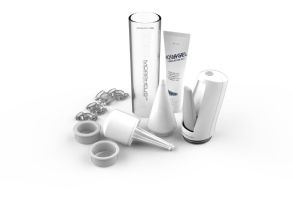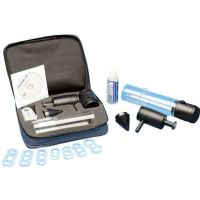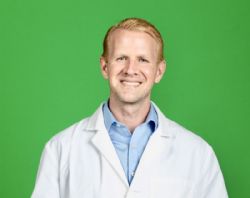 Written by Dr. Eric Wood, ND, MA
Written by Dr. Eric Wood, ND, MA
Also known as impotence, erectile dysfunction affects adult males of all ages, occurring when the penis does not receive adequate blood supply to produce or sustain an erection. Estimated to affect 30 million males in the United States alone, erectile dysfunction (ED) is very common, especially among older men. But in recent years, the prevalence of ED is growing among younger men, as well - at least one in four patients seeking medical help for new onset erectile dysfunction is under 40 years old. If you or a loved one is struggling with erectile dysfunction, we invite you to keep reading so you can learn more about this condition, what causes it, and how to effectively treat it.
 | The Morpheus Vacuum Erection Device by Reflexonic View Product |
Although erectile dysfunction is often considered an older man’s health issue, ongoing research indicates this condition is affecting younger men in their 20s and 30s more frequently in recent years. Because of the embarrassment often associated with ED, some studies show that as much as 30 percent of males under the age of 40 may be affected by this condition, but do not report it to their doctor. Just like the causes for middle-aged or older men, ED in younger men can be caused by organic, psychological, and relational factors, all of which should be assessed by a healthcare professional to ensure proper treatment.
Past and ongoing research demonstrates that experiencing erectile dysfunction before the age of 40 may be an early indicator for developing cardiovascular disease in later years. With a variety of efficacious treatment modalities available for this common disorder, young men should not delay in seeking out medical advice.
Recommended: The Morpheus Vacuum Erection Device by Reflexonic
 | Encore Deluxe Battery and Manual Vacuum Erection Penis Pump View Product |
Increasing the risk of atherosclerosis, heart disease, type 2 diabetes, high cholesterol, and other serious medical conditions that often contribute to erectile dysfunction, obesity alone can also cause ED. Losing weight will not only positively affect these cardiovascular, circulatory, and metabolic disorders, but may also be one of the best ways to restore normal erectile function. Often associated with a two-fold increase in strokes, heart attacks, and cardiovascular death beyond traditional risk factors, an ED diagnosis in younger men may indicate a greater propensity for arterial hardening and heart disease as they age. Getting your weight under control is important to optimize overall health, which will lead to better blood flow for the penis.
Like obesity, smoking and excessive alcohol use can result in many of the same adverse health conditions that contribute to erectile dysfunction. Along with its ability to damage just about every part of the body, smoking tobacco injures the lining of the blood vessels, including those found in the penis - making it physically impossible to achieve an erection. Smoking may have an even more detrimental effect on erectile function for young men than for middle-aged or older men. Quitting smoking helps most males of any age to reduce the severity and frequency of the erectile dysfunction they experience.
While a little alcohol can act as an aphrodisiac, drinking too much can affect your ability to attain and maintain an erection. Depressing the central nervous system and decreasing the sensory stimulation necessary to sustain an erection, excessive alcohol consumption also decreases blood flow to the penis, as it naturally dehydrates the body, lowering the volume of blood circulation. By increasing angiotensin, a hormone linked to erectile dysfunction, even a moderate intake of alcohol can also delay ejaculation.
A sedentary lifestyle is one of the main contributors to the development of erectile dysfunction problems, as a lack of physical activity results in poor vascular health and a host of other health issues. Research has demonstrated that increased physical activity improves sexual function in young, healthy men. One Harvard study showed that with just 30 minutes of walking every day, the risk of erectile dysfunction dropped 41 percent! A systematic review of the research showing physical activity as a possible treatment for ED concluded that overall, the weekly exercise of 160 minutes for 6 months could decrease erectile problems in men with ED - especially when a sedentary lifestyle, obesity, hypertension, metabolic syndrome, and cardiovascular diseases cause the erectile dysfunction.
Playing a key role in initiating the series of specific physical events that result in an erection, the brain first triggers feelings of sexual excitement. But a variety of mental disorders can interfere with those sexual feelings, either causing or worsening erectile dysfunction. Depression, anxiety, and other psychogenic conditions often disrupt the signals the brain sends, decreasing the blood flow to the penis. Unfortunately, the tranquilizers, antidepressants, and other medications used to treat anxiety and depression often result in ED or make it worse. Anxiety is one of the most common psychological causes of erectile dysfunction, while depression can adversely affect both sexual desire and sexual function.
Although stress can be a powerful motivator and we need it to survive, even the simplest stressors can negatively affect your ability to attain and maintain an erection. Like anxiety and depression, unresolved stress inhibits the brain’s ability to send the proper signals for sexual performance. Common stressors include work, relationships, family, and finances. Stress can also lead to high blood pressure and other conditions that make ED worse, such as performance anxiety. Affecting up to 25 percent of men, performance anxiety is primarily caused by negative thoughts - feeling pressured to please their partners, fear and anxiety about body image and penis size, and feeling insecure about their ability to perform sexually.
Recommended: Encore Deluxe Battery and Manual Vacuum Erection Penis Pump
Erectile dysfunction is often caused by factors that include a poor diet, low physical activity, unresolved stress, and unhealthy habits like smoking and excessive alcohol intake. Making some healthier lifestyle adjustments, such as adding more fruits, vegetables, and flavonoids to your diet, exercising, quitting smoking, taking daily walks, and reducing alcohol consumption can all help to reduce erectile dysfunction, especially for young men under 40. Managing stress and mental health disorders with therapy can also help to sort out the underlying psychogenic factors that raise the risk of ED. For those who require help beyond lifestyle changes, penile pumps and oral medications like Viagra and Cialis offer effective treatment, but they are more often utilized by older men.
Especially disruptive for young men, erectile dysfunction is a common condition that has many potential causes. Affecting every aspect of a man’s life, including his mental, physical, and relational health, rates of erectile dysfunction are rising for young men under the age of 40. Most commonly caused by poor lifestyle choices and concurrent health issues like cardiovascular disease, ED is usually treatable - be sure to consult your doctor to rule out any underlying causes and to develop the best treatment plan for your unique needs.This is especially the case if the more typical causes for younger men and ED don't seem to fit your situation. Less common issues like nerve damage, trauma to the area from sports or an accident, etc. for instance may be possibly contributing as well.
Thanks for taking the time to learn more about erectile dysfunction in your 30s and how to treat it. Be sure to check out our superior quality impotence products, along with perusing our other helpful, educational articles at Caregiver University.
>> Shop Impotence Products <<
Dr. Wood is a licensed naturopathic doctor in Washington D.C. and founder of Visionary Health. A graduate of the Canadian College of Naturopathic Medicine, Dr. Wood is a professor at John Patrick University in the Integrative and Functional Medicine Department as well as an adjunct professor at the American College of Healthcare Sciences in Holistic Nutrition. He began his career as a specialty physician for two leading supplement US companies, Neuroscience Inc. and Life Extension. Over his fifteen-year career in integrative and holistic medicine, he has worked in diverse capacities including as an educator; writer; medical advisor, consultant and formulator for supplement companies and treatment centers in the US and the EU; public speaker; and clinician. He has long been a practicing advocate of lifestyle medicine, fitness and mind body medicine approaches initially spurred by aging family members not getting help from traditional medicine and is passionate about innovating and bringing natural and integrative medicine to the masses!